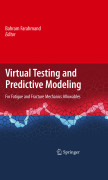
Virtual testing and predictive modeling: fatigue and fracture mechanics allowables
Farahmand, B.
Virtual Testing and Predictive Modeling: Fatigue and Fracture Mechanics Allowables provides an overview of cost and time efficient methods in measuring thequality of industrial structural parts. Readers will find a systematic introduction to virtual testing to generate fatigue and fracture allowables through two useful techniques: the conventional continuum mechanics approach, and the utilization of multiscale modeling and simulation techniques to predict materials’ properties. A chapter devoted to the functionalization process covers thecurrent approach to this technique, which strengthens interface durability through bonding dissimilar materials. Coverage of verification methods, used with devices such as the Transmission Electron Microscope (TEM) and the Atomic Force Microscope (AFM), are also described, which motivate discussion of the fundamental structure and deformation processes of nanoscale materials. Provides cost-effective and efficient approaches to obtain fatigue and fracture data Describes virtual testing techniques that prove adequate life in manufactured structural parts Written with a unique emphasis on applications beneficial to industry professionals INDICE: Virtual Testing and its Applications to Aerospace Structures.- An Integrated Approach to the Damage Tolerant Assessment of Primary Structural Components.- Cohesive Technology Applied to The Modeling and Simulation of Fatigue Failure.- Fatigue Damage Map as a Virtual Tool for Fatigue Damage Tolerance.- Methods in High Temperature Crack Initiation and Growth in Components.- Computational Approach Toward Advanced Composite Material Qualification and Structural Certification.- Analytical Model of Multiscale Fatigue Crack Growth: Nano/Micro and Micro/Macro Transitions.- Multiscale Modeling of Composite Materials.- Predictive Modeling.- Multiscale Approach to Predicting the Mechanical Behavior of Polymeric Materials.- Prediction of Damage Propagation and Failure of Composite Structures (Without Testing).- Functional Nanostructured Polymer-Metal Interfaces.- Verification of Multiscale Models Using In-Situ ExperimentalTechniques.
- ISBN: 978-0-387-95923-8
- Editorial: Springer
- Encuadernacion: Cartoné
- Páginas: 460
- Fecha Publicación: 01/08/2009
- Nº Volúmenes: 1
- Idioma: Inglés
